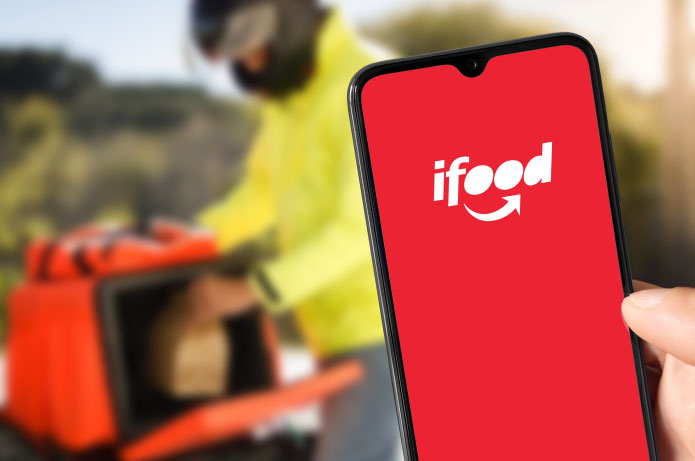Durante a COP30, o iFood anuncia a ampliação do iFood Pedal, que se torna o maior programa de descarbonização de delivery com bicicletas elétricas da América Latina. Nesta nova fase, em parceria com a Tembici, o contrato prevê a possibilidade de expansão do programa de entregas elétricas com até 45 mil e-bikes, sendo 20 mil incorporadas até 2027, o que elevará a frota total para mais de 25 mil bicicletas elétricas em operação no país nos próximos meses.
Por meio da iniciativa, o iFood vai investir até R$300 milhões para ampliar o acesso a um modal mais limpo, econômico, eficiente e com potencial de ampliar os ganhos dos entregadores. Além disso, a ampliação do programa reforça o compromisso da empresa com a mobilidade sustentável. A expansão das bicicletas elétricas representa uma redução estimada de 7,5 mil toneladas de CO₂ por ano, volume de carbono que cerca de 300 mil árvores levariam um ano para absorver.
“Fazer esse anúncio durante a COP30 reforça o compromisso do iFood com um crescimento sustentável e com a liderança na transição energética no Brasil. Mostramos que é possível conciliar propósito, tecnologia e impacto positivo em escala. Como empresa brasileira, seguimos impulsionando a economia e fortalecendo comunidades – porque crescer juntos é o que move o iFood”, afirma Luana Ozemela, CSO e vice-presidente de Impacto e Sustentabilidade do iFood.
A Tembici, parceira do iFood desde o início do programa, é a maior operadora de micromobilidade na América Latina, com mais de 25 mil bicicletas e presença em quatro países. A empresa, referência em mobilidade urbana sustentável, atua na operação e expansão das e-bikes utilizadas pelos entregadores em diversas capitais do país. Para Tomás Martins, CEO e co-fundador da Tembici, a expansão do projeto reforça o compromisso da empresa em garantir modelos de micromobilidade cada vez mais escaláveis, inclusivos e sustentáveis.
“Estamos muito felizes em anunciar a expansão de um projeto que une geração de renda sustentável e uma operação de zero emissões de carbono, que já evitou potencialmente mais de 13 mil toneladas de CO₂. Desde 2020, essa parceria vem evoluindo com aprendizados valiosos e agora dá um passo histórico, tornando-se o maior projeto de descarbonização por meio de bicicletas elétricas da América Latina e uma oportunidade real de trabalho e estabilidade para os cicloentregadores em um modelo realmente escalável e transformador para as cidades”, comenta o executivo.
Empresa brasileira que é referência global
O avanço do iFood Pedal faz parte de uma estratégia mais ampla da empresa para reduzir emissões e promover soluções de mobilidade urbana sustentáveis. Além dos investimentos em modais elétricos, o iFood atua em frentes nacionais e internacionais que consolidam seu protagonismo em inovação climática e inclusão nas cidades. Confira:
Fórum Econômico Mundial – O iFood Pedal figurou no relatório Last Mile Delivery, como uma das principais referências globais em mobilidade sustentável e inovação logística. O programa combina eficiência operacional, inclusão social e impacto ambiental positivo, mostrando como soluções criadas no Brasil podem inspirar políticas públicas e práticas empresariais em outros países.
Representação brasileira em coalizões internacionais: A empresa é a única representante do Brasil na coalizão global Deliver-E, apoiada pelo Programa das Nações Unidas para o Meio Ambiente (PNUMA/UNEP). O grupo reúne companhias como Uber, DoorDash, Delivery Hero e Zomato para acelerar a eletrificação das entregas no mundo.
Liderança empresarial na SB COP: O iFood integra a Sustainable Business COP (SB COP), frente empresarial da conferência que reúne companhias brasileiras para construir soluções conjuntas em uma economia de baixo carbono. Na iniciativa, a empresa lidera grupos de trabalho sobre mobilidade sustentável e inovação verde, fortalecendo o papel do setor privado na transição climática.
Estrutura e bem-estar dos entregadores: Como parte dessa visão de sustentabilidade urbana, o iFood mantém um programa contínuo de criação de Pontos de Apoio para entregadores, espaços gratuitos com estrutura de descanso, hidratação e recarga de celulares e bicicletas. Atualmente, 30 unidades estão em operação em diversas regiões do país. A mais recente foi inaugurada em Belém. Este novo espaço é o primeiro da cidade e reúne práticas sustentáveis em todo o projeto, tornando-se referência nacional em infraestrutura para entregadores. A ambientação valoriza a cultura local, com obras de artesãos da região, e adota soluções como iluminação e ventilação naturais, móveis de madeira de reflorestamento, coleta seletiva e arquitetura biofílica.
Protagonismo brasileiro
Empresa de tecnologia 100% brasileira, o iFood é referência em inovação, sustentabilidade e desenvolvimento econômico. Seu ecossistema movimenta R$140 bilhões por ano, o equivalente a 0,64% do PIB nacional, e gera mais de 1 milhão de postos de trabalho diretos e indiretos.
A plataforma realiza mais de 160 milhões de pedidos por mês, conectando 60 milhões de clientes mensalmente, 450 mil estabelecimentos parceiros – entre restaurantes, mercados, farmácias e pet shops – e 450 mil entregadores ativos em mais de 1.500 cidades. Hoje,o iFood subsidia parte do aluguel.
Com base em tecnologia de ponta, o iFood aprimora diariamente a eficiência das entregas e a experiência dos parceiros, utilizando inteligência artificial e modelos preditivos para otimizar rotas, reduzir o tempo de espera nos restaurantes e garantir maior eficiência nas rotas dos entregadores. Recentemente, o iFood anunciou um investimento de R$17 bilhões até março de 2026, destinado à expansão tecnológica, ao fortalecimento logístico e ao crescimento de todo o ecossistema. Desse total, a empresa estima que os ganhos dos profissionais de entrega que atuam na plataforma alcançarão R$ 5,2 bilhões no período, um aumento de 27% em relação ao ano anterior.
“A nova fase do iFood Pedal, em parceria com a Tembici, reforça o nosso comprometimento em inovação logística para reduzir a emissão de gases poluentes e ampliar o leque de soluções para os entregadores. Essa expansão é um passo importante para acessibilidade de veículos eficientes, gerando valor para todo ecossistema de entregadores, clientes e parceiros”, finaliza Mariana Werneck, Diretora Sênior de Logística do iFood.


